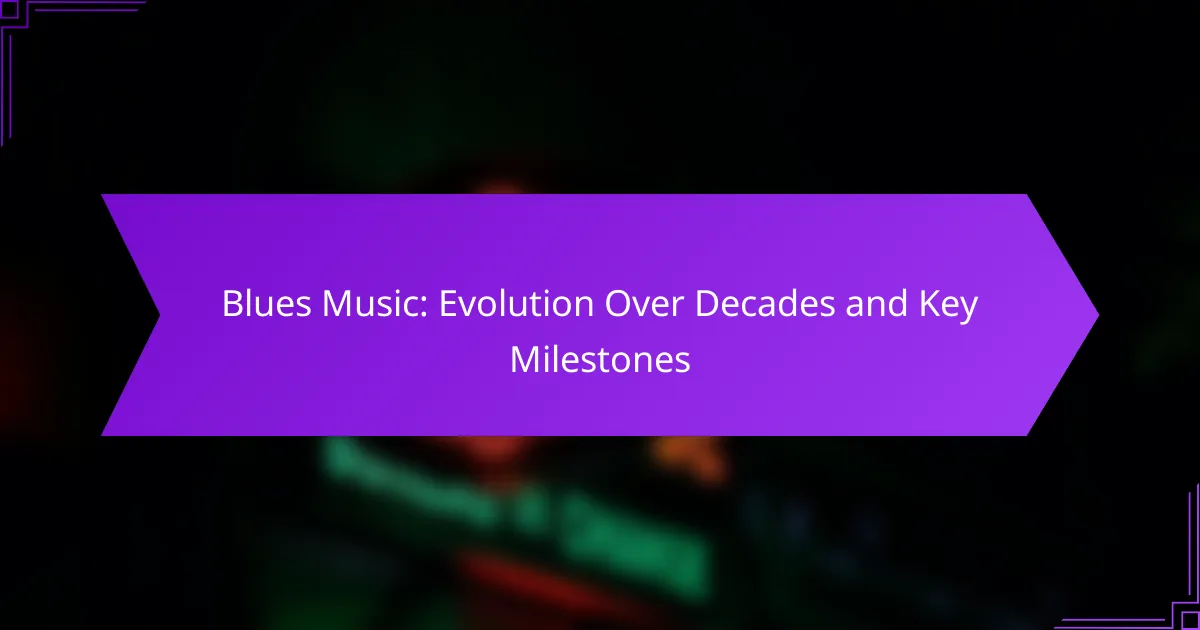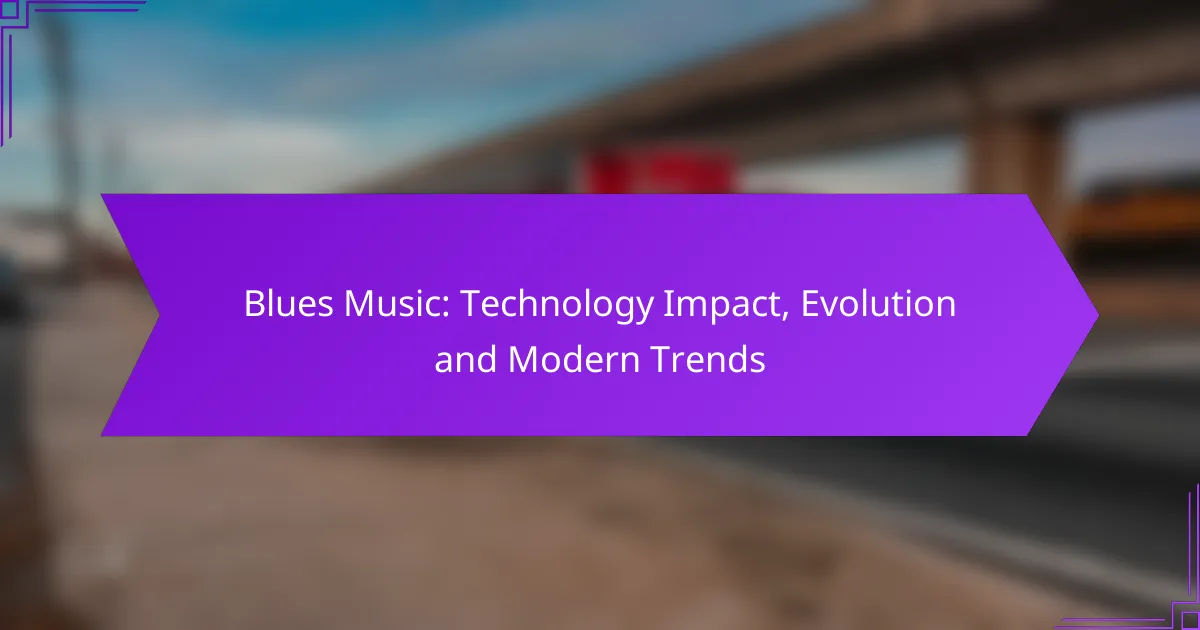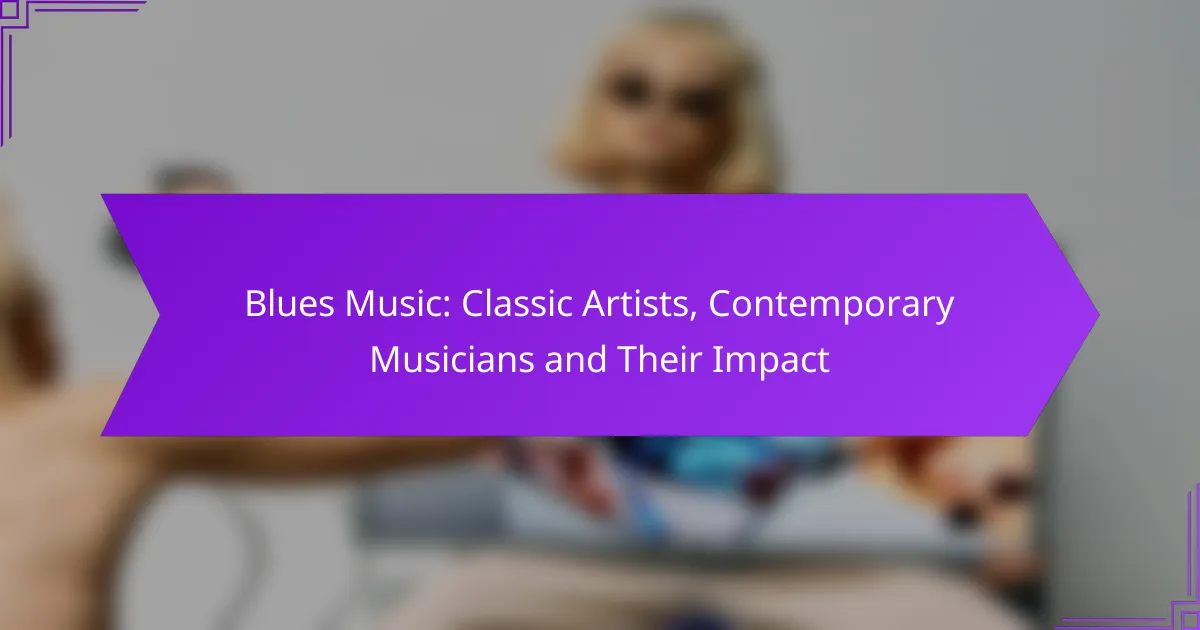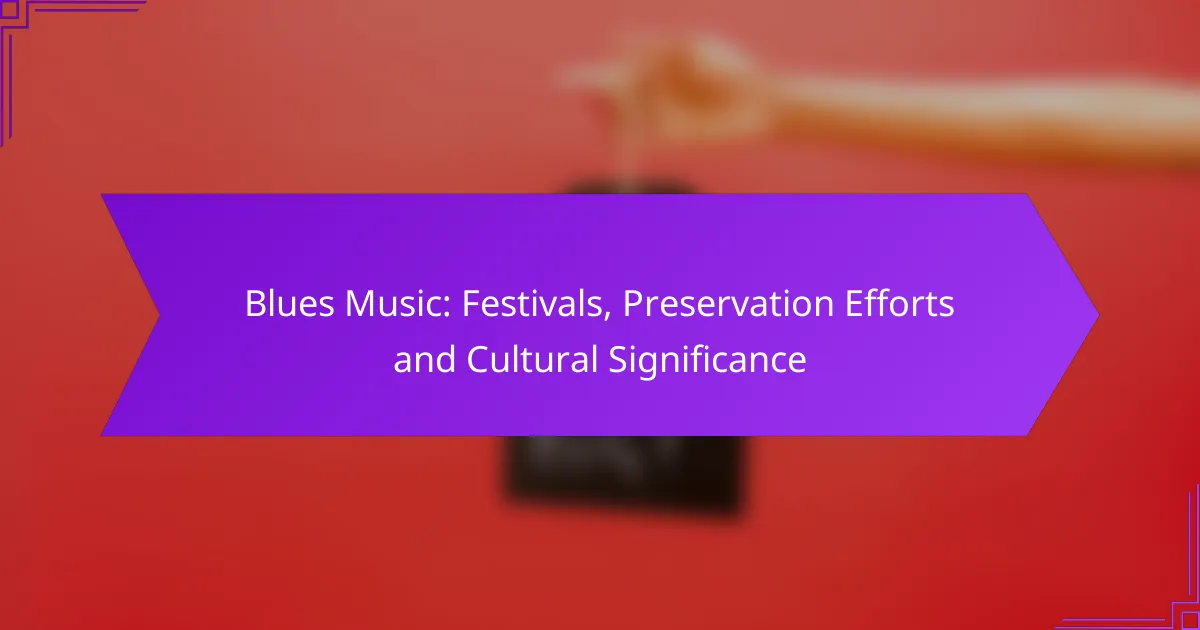Blues music has evolved significantly since its origins, reflecting cultural shifts and technological advancements that have shaped its sound and style. Key milestones, such as the rise of electric blues and the establishment of blues festivals, highlight its enduring influence on modern music and its diverse subgenres. This genre not only serves as a historical foundation but also continues to inspire contemporary artists across various musical landscapes.
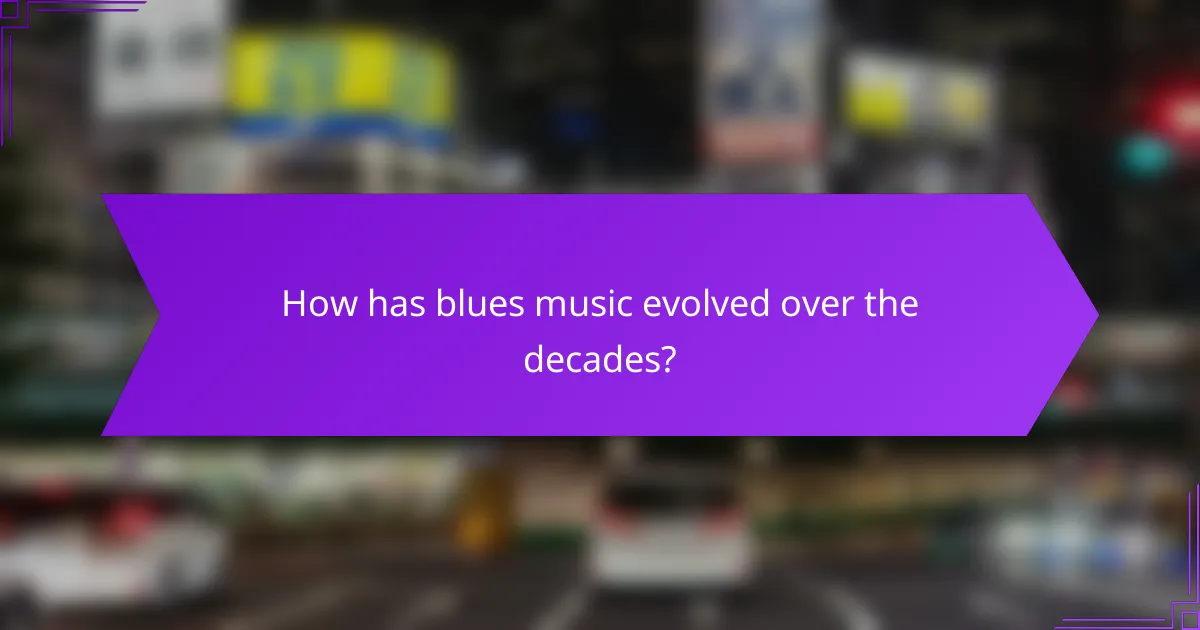
How has blues music evolved over the decades?
Blues music has undergone significant evolution since its inception, adapting to cultural changes and technological advancements. Its transformation reflects shifts in musical styles, social contexts, and the influence of various artists, leading to diverse subgenres and a lasting impact on modern music.
Key changes in blues styles
Blues music has seen a variety of stylistic changes, starting from its roots in the African American communities of the Deep South to contemporary forms. Early Delta blues featured acoustic instruments and a raw, emotional sound, while Chicago blues introduced electric instruments and a more polished production. Today, genres like blues-rock and soul-blues incorporate elements from rock and pop, broadening the appeal.
Additionally, the incorporation of jazz and R&B elements in the mid-20th century led to the birth of subgenres such as jump blues and soul blues. These styles often featured horn sections and more complex arrangements, making them suitable for larger audiences and dance venues.
Influential artists through the decades
Throughout its history, numerous artists have shaped the blues genre. In the early 20th century, figures like Robert Johnson and B.B. King laid the groundwork with their innovative guitar techniques and storytelling lyrics. Their influence can still be felt in the works of contemporary blues musicians.
The 1960s and 1970s saw artists like Muddy Waters and Howlin’ Wolf bring blues to mainstream audiences, while also inspiring rock musicians such as Eric Clapton and The Rolling Stones. In recent years, artists like Joe Bonamassa and Susan Tedeschi have continued to push the boundaries of blues, blending it with other genres and attracting new fans.
Impact of cultural shifts on blues
Cultural shifts have significantly impacted the evolution of blues music. The Great Migration saw many African Americans move to urban areas, leading to the development of new blues styles that reflected urban life and experiences. This transition allowed blues to evolve from a rural folk tradition to a more commercialized genre.
Moreover, the civil rights movement in the 1960s brought social issues to the forefront, influencing the lyrical content of blues music. Artists began to address themes of struggle, identity, and resilience, making the genre a powerful voice for change. Today, blues continues to reflect contemporary social issues, ensuring its relevance in modern society.
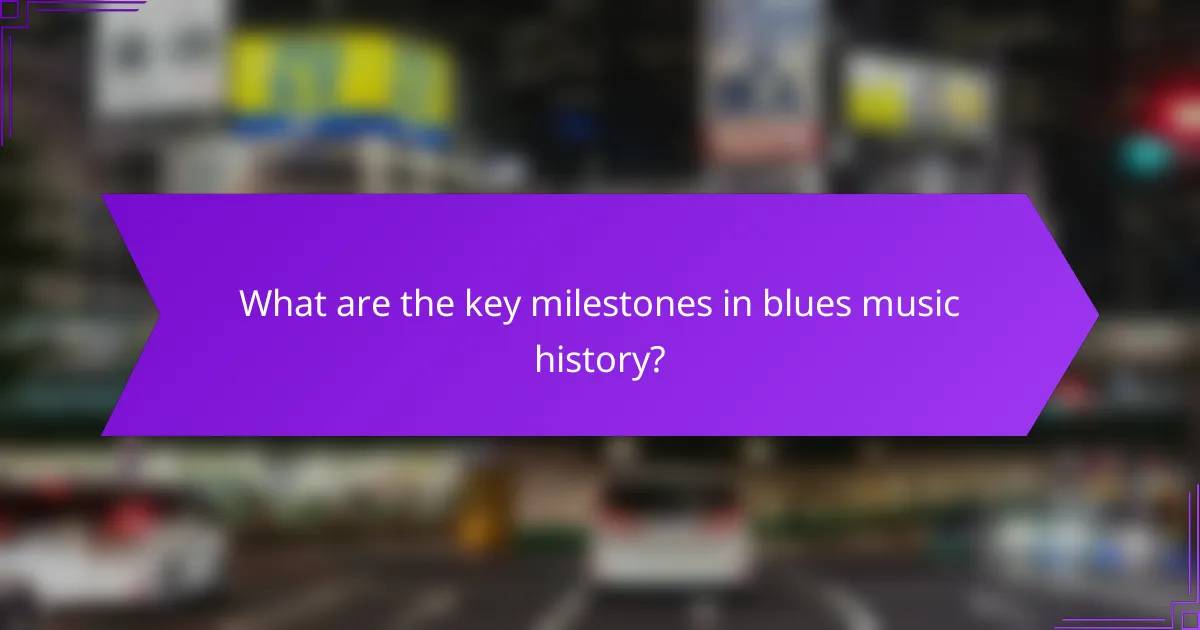
What are the key milestones in blues music history?
Key milestones in blues music history include the genre’s origins, the rise of electric blues, and the establishment of blues festivals. These developments have shaped the sound and cultural significance of blues music over the decades.
Birth of the blues genre
The blues genre originated in the late 19th century, primarily among African American communities in the Deep South of the United States. It evolved from spirituals, work songs, and folk music, characterized by its expressive lyrics and unique chord progressions.
Early blues musicians like W.C. Handy and Bessie Smith played crucial roles in popularizing the genre. Their recordings in the 1920s helped to lay the foundation for future blues styles and influenced countless artists across various music genres.
Introduction of electric blues
The introduction of electric blues in the 1940s marked a significant evolution in the genre, allowing musicians to amplify their sound and reach larger audiences. Artists such as Muddy Waters and Howlin’ Wolf were pivotal in this transition, using electric guitars and harmonicas to create a more powerful and dynamic sound.
This shift not only transformed the blues but also paved the way for rock and roll. The electric blues style became a staple in music venues and influenced many future musicians, leading to the emergence of subgenres like Chicago blues.
Blues festivals and their significance
Blues festivals began to gain popularity in the 1960s, celebrating the genre and bringing together artists and fans. These events, such as the Chicago Blues Festival and the New Orleans Jazz & Heritage Festival, serve as important cultural gatherings that promote blues music and its heritage.
These festivals provide a platform for both established and emerging artists, fostering community and preserving the blues tradition. They also attract tourism, contributing to local economies and enhancing the cultural landscape of their host cities.
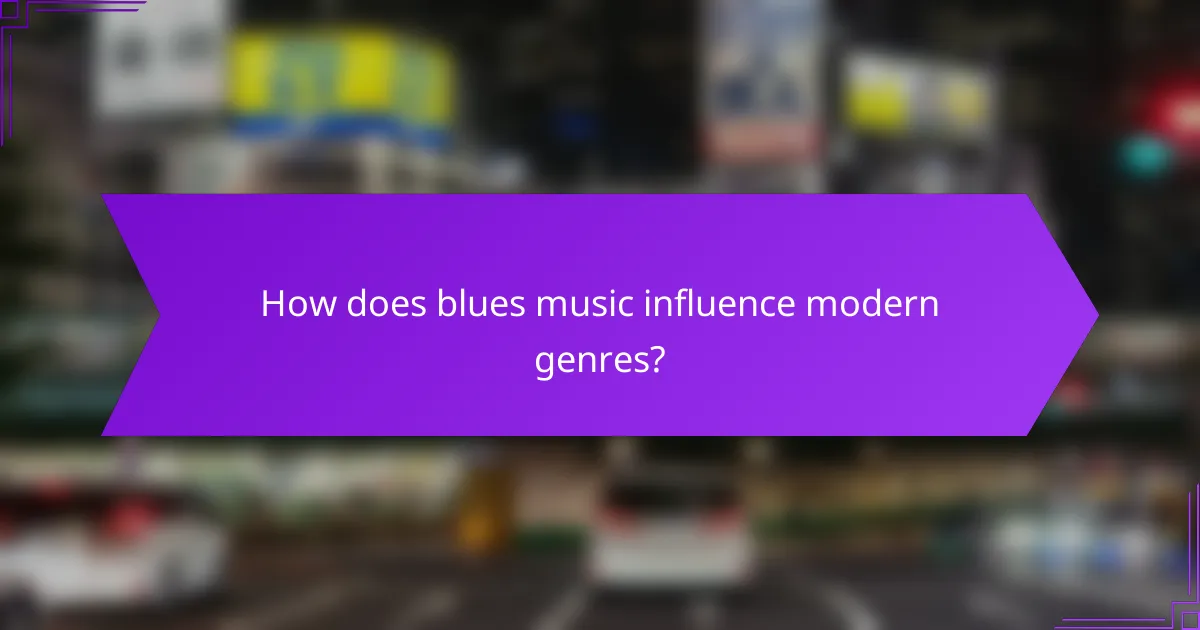
How does blues music influence modern genres?
Blues music significantly influences modern genres by shaping their sound, structure, and emotional expression. Elements such as the twelve-bar blues progression, call-and-response patterns, and expressive guitar techniques are foundational in genres like rock, pop, and jazz.
Blues’ impact on rock music
Rock music owes much of its identity to blues, particularly in its rhythm and guitar work. Iconic rock artists like Eric Clapton and The Rolling Stones have drawn heavily from blues traditions, incorporating its emotional depth and improvisational style into their music.
The use of blues scales and riffs in rock songs creates a familiar yet dynamic sound that resonates with audiences. For instance, many classic rock anthems feature guitar solos that mimic the expressive bends and slides characteristic of blues guitarists.
Blues in contemporary pop
Contemporary pop music integrates blues elements to enhance emotional storytelling and musicality. Artists like Adele and John Legend utilize bluesy vocal techniques and chord progressions to convey deep feelings, making their songs relatable and impactful.
Additionally, the fusion of blues with pop has led to the emergence of subgenres such as blues-pop, where catchy melodies meet traditional blues structures. This blend not only broadens the appeal of blues but also keeps its legacy alive in modern music.
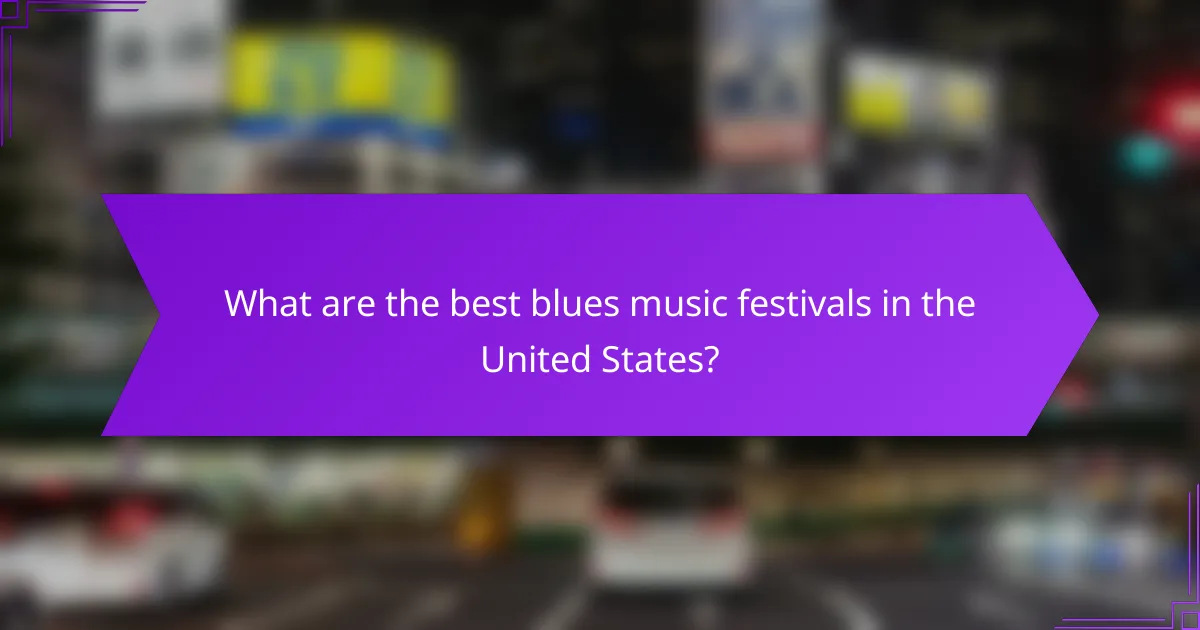
What are the best blues music festivals in the United States?
Some of the best blues music festivals in the United States include the Chicago Blues Festival and the New Orleans Jazz & Heritage Festival. These events showcase a wide range of blues artists and celebrate the genre’s rich history and cultural significance.
Chicago Blues Festival
The Chicago Blues Festival, held annually in Grant Park, is one of the largest free blues festivals in the world. It typically features a diverse lineup of local and national blues musicians, offering attendees a chance to experience the roots of the genre in its birthplace.
Visitors can enjoy multiple stages with performances spanning different styles of blues, from traditional to contemporary. The festival also includes workshops, panel discussions, and food vendors, making it a comprehensive celebration of blues culture.
New Orleans Jazz & Heritage Festival
The New Orleans Jazz & Heritage Festival, often referred to as Jazz Fest, is a premier event that highlights not only blues but also jazz, R&B, and other genres. This festival takes place over two weekends in late April and early May, attracting music lovers from around the globe.
Jazz Fest features a mix of established artists and emerging talent, with a strong emphasis on local musicians. Attendees can explore various stages, enjoy local cuisine, and participate in cultural exhibits, making it a vibrant showcase of New Orleans’ musical heritage.
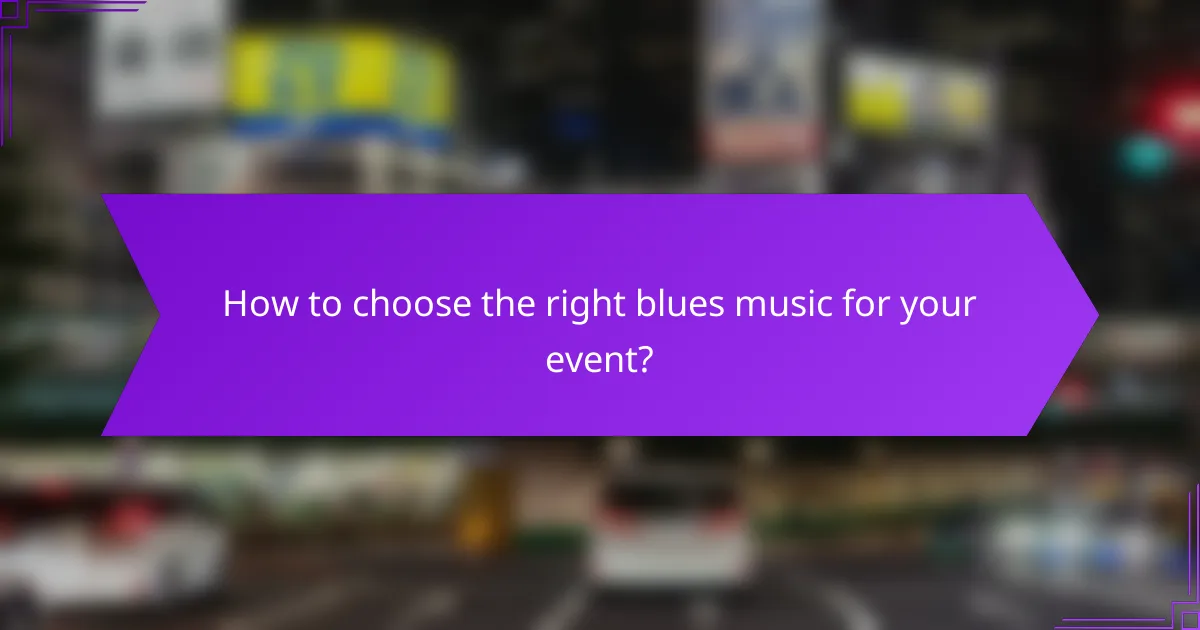
How to choose the right blues music for your event?
Selecting the right blues music for your event involves understanding your audience and the atmosphere you want to create. Consider the preferences of your guests and the specific vibe you wish to achieve, whether it’s upbeat or more soulful.
Consider the audience’s preferences
Understanding your audience’s musical tastes is crucial when choosing blues music. If your guests are familiar with classic blues artists like B.B. King or Muddy Waters, incorporating their hits can resonate well. For a younger crowd, consider modern blues artists who blend genres, such as Gary Clark Jr. or Joe Bonamassa.
Conducting a quick survey or asking a few attendees about their favorite blues styles can provide insight. This approach ensures that the music aligns with what your guests enjoy, enhancing their overall experience.
Match the mood with the right blues style
The mood of your event should dictate the style of blues music you select. For a lively gathering, upbeat styles like Chicago blues or jump blues can energize the atmosphere. In contrast, for a more intimate setting, slow blues or Delta blues can create a reflective and emotional ambiance.
Consider the time of day and the nature of the event as well. For example, a cocktail hour might benefit from smooth, jazzy blues, while a late-night party could call for more energetic, danceable tracks. Tailoring the music to the occasion will help ensure that it complements the overall experience.
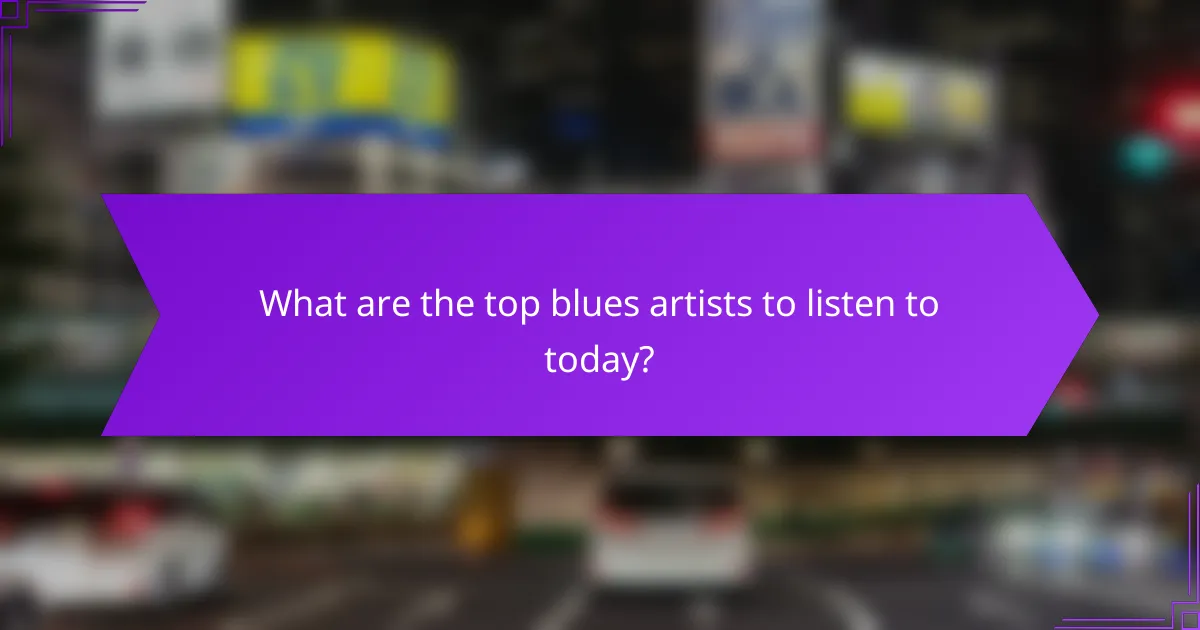
What are the top blues artists to listen to today?
Some of the top blues artists to listen to today include Buddy Guy, Gary Clark Jr., and Susan Tedeschi. These musicians are known for their exceptional talent and contributions to the blues genre, blending traditional elements with contemporary styles.
Buddy Guy
Buddy Guy is a legendary blues guitarist and singer, celebrated for his powerful performances and influence on modern blues. His style combines traditional Chicago blues with rock elements, making him a pivotal figure in the genre.
Guy’s career spans several decades, and he has received numerous awards, including multiple Grammy Awards. His albums, such as “Damn Right, I’ve Got the Blues,” showcase his unique sound and storytelling ability.
To truly appreciate Buddy Guy, listen to his live performances, where his improvisational skills shine. His ability to connect with the audience and convey emotion through music is unparalleled, making him a must-listen for any blues enthusiast.
